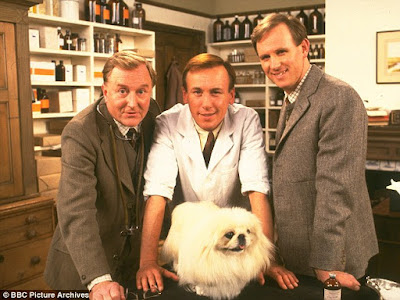My siblings and I bought our dad a set of Frances Hodgson Burnett books for Christmas. He is now reading them aloud to the family.
You know what I never knew though? A Little Princess as we know it is not the original published work. In fact, it was much shorter when Frances Hodgson Burnett first published it. There's an explanation in the beginning of my dad's book which tells all about it, and I found it very sweet the way the author chose to write this explanation.
Which is why I'm here, actually. Because I wanted to share it with all of you.
The Whole of the Story
I do not know whether many people realize how much
more than is ever written there really is in a story--how many parts of it are
never told--how much more really happened than there is in the book one holds
in one's hand and pores over. Stories
are something like letters. When a
letter is written, how often one remembers things omitted and says, "Ah,
why did I not tell them that?" In
writing a book one relates all that one remembers at the time, and if one told
all that really happened perhaps the book would never end. Between the lines of every story there is
another story, and that is one that is never heard and can only be guessed at
by the people who are good at guessing.
The person who writes the story many never know all of it, but sometimes
he does and wishes he had the chance to begin again.
When I
wrote the story of "Sara Crewe" I guessed that a great deal more had
happened at Miss Minchin's than I had had time to find out just then. I knew, of course, that there must have been
chapters full of things going on all the time; and when I began to make a play
of the book and called it "A Little Princess," I discovered three
acts full of things. What interested me
most was that I found that there had been girls at the school whose names I had
not even known before. There was a
little girl whose name was Lottie, who was an amusing little person; there was
a hungry scullery-maid who was Sara's adoring friend; Ermengarde was much more
entertaining than she had seemed at first; things happened in the garret which
had never been hinted at in the book; and a certain gentleman whose name was
Melchisedec was an intimate friend of Sara's who should never have been left
out of the story if he had only walked into it in time. He and Becky and Lottie lived at Miss
Minchin's, and I cannot understand why they did not mention themselves to me at
first. They were as real as Sara, and it
was careless of them not to come out of the story shadowland and say,
"Here I am--tell about me."
But they did not--which was their fault and not mine. People who live in the story one is writing
ought to come forward at the beginning and tap the writing person on the
shoulder and say, "Hallo, what about me?" If they don't, no one can be blamed but
themselves and their slouching, idle ways.
After the play of "A Little Princess" was produced in New York, and so many children went to see it and liked Becky and Lottie and Melchisedec, my publishers asked me if I could not write Sara's story over again and put into it all the things and people who had been left out before, and so I have done it; and when I began I found there were actually pages and pages of things which had happened that had never been put even into the play, so in this new "Little Princess" I have put all I have been able to discover.
After the play of "A Little Princess" was produced in New York, and so many children went to see it and liked Becky and Lottie and Melchisedec, my publishers asked me if I could not write Sara's story over again and put into it all the things and people who had been left out before, and so I have done it; and when I began I found there were actually pages and pages of things which had happened that had never been put even into the play, so in this new "Little Princess" I have put all I have been able to discover.
~Frances Hodgson Burnett~
Isn't that so cute, though? I love the way she talks about her characters as if they were real people with minds of their own. And how she practically scolds them for their "slouching, idle ways" in not making their appearance into the story much sooner. *chuckle*
Also the point she makes about stories being like letters, with so many things omitted in the telling. This really struck a chord with me. I've never written a complete story myself, but from the pitiful attempts I've made over the years, I've long since discovered that it is very hard to express all that one would wish to express. And I think it must be very true that there is much more to a story than what actually makes it onto the page.
Tell me, have you ever written a story? If so, have you ever had characters who surprised you by popping into your story unexpectedly? And when you were finished writing, did you feel like your story was complete, or did you feel like there was still more to be told?
Let's talk about it!























